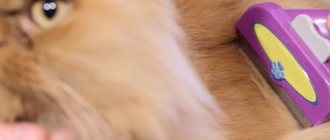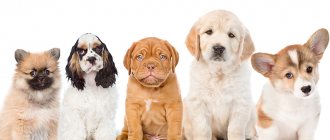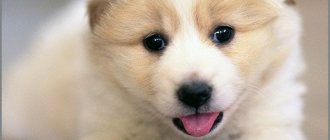What is a dog for?
Why do you need me?
In order to choose the right puppy and subsequently not regret your decision, first of all, you need to sincerely answer the question: “Why do I need a dog?” Depending on the breed, dogs can serve as guards, watchmen, hunters, companions, or simply loyal friends. Perhaps all your life you have dreamed of walks in the fresh air with a Siberian husky, or you prefer an evening on the couch with a miniature toy terrier by your side, or maybe you want to spend time like a king in the company of a Welsh Corgi? Some owners are crazy about long-haired breeds, with which they can experiment with hairstyles and buy them fun accessories, while other owners prefer short-haired animals that they don’t have to vacuum every day.
Before getting a dog, carefully weigh the pros and cons. Make sure that your family members support this idea and that the psychological climate in the house is quite calm. Read articles about the care and maintenance of dogs and evaluate your strengths.
If the decision to adopt a puppy has been made, and it is unshakable, you need to decide why you need a dog, and, accordingly, what breed, gender and category of pets to consider.
Dogs of any breed are divided into 3 classes.
- Pet. Translated from English, pet means “domestic animal.” As the name suggests, this category includes simple dogs “for the home.” They cannot be shown and are not suitable for breeding due to any deviation from the breed standard. Such animals are castrated or sterilized so that the defect is not passed on to the offspring. But non-standard does not mean bad, a puppy of the pet category can grow up to be a beautiful, smart dog and become your devoted friend. Pet class puppies are cheaper than others.
- Breed. Breed is translated as “breed”. Breed-class dogs have a good pedigree, they meet the breed standard, but with minor features. They participate in exhibitions where they do not claim to win. Their main task is to produce offspring in which the genes of outstanding ancestors can manifest themselves. Breed category puppies are significantly more expensive than pet ones.
- Show. The word show does not need translation. Show class puppies are the best of the best. Experts know these pets by name, and at exhibitions they have no equal. Often you have to reserve a champion puppy even before its birth. Show class is the most expensive category of dogs.
Features of buying a purebred puppy
Owners of purebred dogs face most of the nuances. In addition to general points, they will have to take care of choosing a pet class and a complete set of documents.
Choosing a nursery or breeder
All activities related to dog breeding are controlled by the RKF - Russian Canine Federation. Animals with all the necessary papers confirming their health and breed must be purchased from nurseries or from private breeders.
An official organization or representative must provide documents confirming its registration with the RKF, prove the origin of the litter and stamp its pupils. Possible options can be found on the Internet or through kennel clubs.
Pet, breed or show class
The class of the dog determines conformity to the exterior. Choose it depending on the purpose of purchasing a pet:
- pet class - suitable for purchasing a companion animal, as they are characterized by the presence of some external defects;
- breed class - recommended for breeding, can participate in exhibitions, but rarely achieves prizes;
- show class - an elite group of future international winners with an ideal exterior.
Show class will cost the most. Prices for such animals can be 3-4 times higher than prices for the pet class.
Litter and its parents
Do not take babies from a primiparous or late-parous bitch. They are often born too weak. Also, do not choose a pet from a litter that is too small or too large. This indicates possible complications during childbirth and prevents full feeding. If the breeder hides the litter number, look at the puppy card. Babies born after the first pregnancy receive a nickname starting with the letter “a”. With each subsequent pregnancy, the order of letters in the alphabet tends to end.
After meeting your mother, ask for a photo of your father. Assess his external characteristics and ask him to provide documents from each of his parents. The breeder's refusal to provide information about mom and dad is a good reason to cancel the deal and go elsewhere.
Documents, vaccinations, brand
The responsible seller is obliged to provide a contract, metrics or pedigree, mating certificate, certification and veterinary passport. The last document records the administered vaccines and antiparasitic treatments. Without it it will be impossible to cross the border.
At 1.5 months, a special tattoo or brand is applied to the animal’s body. This is necessary to identify them and prevent substitution at exhibitions.
Boy or girl
After choosing a dog breed, future owners think about what gender of puppy is best to get. In this matter, we recommend focusing on personal sympathies, however, males and females have differences in appearance and behavior that are worth keeping in mind.
Pros and cons of male dogs:
- males are more suitable for participation in sports competitions;
- more powerful and larger than females;
- lazier in matters of training;
- Males have a stronger sex drive. His needs will have to be compensated with long-term physical activity;
- During a walk, the male is active and strives for his fellow tribesmen. If there is a bitch in heat nearby, you will have to hold him tightly on a leash.
Pros and cons of females:
- more domestic and affectionate, more attached to the owner;
- less aggressive and pugnacious;
- sleeker and smaller in size;
- more obedient and easier to train;
- Bitches come into heat 2 times a year. They become nervous, disobedient, and the risk of infections increases. During these periods, the dog needs to be protected from male dogs and monitored especially carefully, because it may try to escape.
In general, it can be noted that the distinguishing feature of males is independence, and that of females is tractability. But a lot depends on the temperament of a particular dog.
Breeding dogs: pros and cons
A dog is man's friend. This thought prompts tens of thousands of people to return to the issue of purchasing a dog, and a larger percentage of them still decide to buy a four-legged friend. In terms of doing business, you should focus on this target group of potential dog owners. But the result will not be visible immediately - a constant flow of buyers and the reputation of a reliable breeder will come to you in a few years. One purchased purebred bitch will not lead to wealth - the costs of maintaining it will nullify the income from the sale of young animals. For a stable income, you should work with 10-12 breeding females and keep two or three active males, ensuring an influx of puppies. The breeder's time will be devoted to caring for the dogs, their maintenance and nutrition.
When choosing a dog breed for breeding, consumer demand should be taken into account. The “fashion” for a particular breed often changes, so if you are not a fanatic of Labradors or Dalmatians, it is best to stick to breeds that are consistently popular in your region. The size of the dogs should also be taken into account - the size and weight of the animal directly affect their “maturity”. Large dogs give birth starting from one and a half years old; animals of medium and small breeds can be bred from 15 months. Litter size can vary as much as the size and average market value of the puppies. In addition, dogs are not rabbits, and they cannot give birth four times a year. The average for all dog breeds is three litters every two years. In order for puppies to have a market value, the breeder should study the profession of a veterinarian, groomer, acquire practical skills in caring for animals and, in the end, just love his job.
How to find a good nursery
So, if you have already decided which breed and gender of puppy is right for you, it’s time to look for a reliable breeder. There is no need to rush when it comes to buying a dog. The animal will live with you for about 15 years, so it is so important to choose the right puppy. Refrain from spontaneous purchases at the poultry market or through free message boards on the Internet. At a minimum, the puppy may not meet the breed standard when it grows up, and at the maximum, there is a risk of buying a sick animal that will have to be treated for a long, expensive and unsuccessful time.
The best place to buy a puppy is a specialized nursery. You can choose a pet together with an experienced dog breeder or on your own, following your heart. As a rule, nurseries have their own websites, and you can find customer reviews about them.
Lifehack: go to a dog show of the breed you dream of. There, see which dogs you like best, meet their owners and find out where they got their puppies. Usually dog lovers are happy to share this information and also give valuable advice. Representatives of leading nurseries also actively participate in exhibition events and will not forget to provide you with business cards.
The number of kennels depends on the popularity of the breed and the region. Having chosen a trustworthy option, call them and make an appointment. During the conversation, ask the breeder about the conditions in which the puppy is kept and its parents. If you have the feeling that they are trying with all their might to urgently sell the puppy, this should alert you. A good breeder will ask you a lot of questions about your family, living conditions, free time and even hobbies to make sure that the puppy will be in good hands and will suit your personality.
How to choose a healthy puppy
It's time to go to the nursery for your future pet. Please note that puppies must be in a clean room that does not have a strong unpleasant odor. Often the breeder begins to show all his diplomas and lists the show titles of the puppy's parents. Listen to this information, but don't let your guard down. In addition to potential championship credentials, it is very important what character the dog will have.
If you have the opportunity to meet the puppy's parents, don't miss it. This way you can evaluate their behavior personally. If you can't arrange a meeting, ask the breeder if they were aggressive, pugnacious or cowardly. These qualities are inherited, as is the desire to howl, tear up furniture and bark for no reason. Look at photographs of the puppy's grandparents, if available.
You should avoid purchasing a sick puppy immediately. However, many diseases are not obvious or may only appear in the future. Try to “talk” to the breeder; he may accidentally mention points that may indirectly indicate the puppy’s illnesses:
- a test for hip dysplasia in giant breed breeders is mandatory; its absence is suspicious;
- if the puppy does not eat well, he may have gastrointestinal or liver diseases;
- dogs with allergies often give birth to puppies with the same problem;
- If an animal is terrified of fireworks, thunderstorms and other loud sounds, then its nervous system is unstable. Hysterical parents are unlikely to give birth to a brave and balanced puppy;
- dogs running away during walks are unwanted producers of offspring;
- In pursuit of profit, unscrupulous breeders may breed dogs with epilepsy, which cannot be noticed until there is a seizure.
A healthy puppy will be active and friendly. If you kneel down and call him, he will come to you. The baby will show curiosity about new people and toys. He should look happy, frolic with his brothers and sisters. In the breeder's arms, the puppy is calm, allows itself to be petted, and normally perceives touches on its paws and face. Avoid buying cowardly and intimidated pets, as well as aggressive and dominant individuals. With age, a dog's character will not change significantly.
10 main external signs of a healthy puppy:
- clear, lively look;
- there is no pus or other discharge in the eyes;
- moist and shiny nose;
- correct bite, the number of teeth corresponds to the standard;
- the ears are pink and clean;
- there are no sores, pimples and, especially, parasites on the skin;
- shiny, silky coat;
- tail without strong creases or docked;
- lymph nodes are not enlarged;
- not a bloated tummy.
A big plus in favor of the breeder will be his agreement to enter into a written contract for the purchase and sale of the puppy. If significant defects specified in the contract are identified, the animal can be returned. In addition, the very presence of “insurance” will discourage the seller from selling a problem pet.
Who should I choose? You are all so cute!
Which puppy should you get?
If you don’t know how to choose a puppy, ask for help from the nearest kennel club that breeds the selected breed. More experienced breeders will tell you the main nuances. You can always pay for a consultation with a specialist who will visit the seller with you.
Never agree to a purchase without first getting to know each other. An unscrupulous breeder can hide an emaciated mother or unsanitary conditions in the premises.
Age
Don't try to take the smallest contender. Up to 2.5 months he needs to be close to his mother in order to receive passive immunity from her. If the separation is too early, the baby will miss his mother and will easily catch a cold from any draft.
It is recommended to adopt purebred animals of breeding or show class no earlier than 6-9 months - only by this age their appearance and possible defects become clear. The larger the dog, the longer it will take to mature.
Health status
All the rules explaining how to choose a purebred dog agree on the need for genetic tests and x-rays for dysplasia. If there is a predisposition to diseases, the seller is obliged to convey this information to the buyer. Feel free to ask your closest relatives about allergies and epilepsy.
When meeting your future pet, make sure that he does not have:
- purulent discharge from the eyes;
- malocclusion;
- sores or parasites on the skin;
- creases on the tail;
- bloated belly;
- dry nose;
- dirt or unpleasant odor in the ears;
- dull and disheveled fur;
- enlarged lymph nodes.
If the baby is healthy, proceed to checking the behavior. To do this, you will have to watch puppy games and try to hold the future pet in your arms.
Character and behavior
The mother and father of the litter should not be aggressive or cowardly. Dogs with this character are not allowed to be bred, as these traits are inherited.
When in doubt about which puppy to choose from the entire litter, call the kids over to you. Choose among the most active and friendly ones, who are not afraid to climb into the arms of a stranger.
However, introverts may like shy animals - this is a personal matter for everyone. The main thing is that excessive calmness is a character trait, and not a sign of illness.
At what age should you pick up a puppy?
Russian dog breeders recommend adopting a puppy at 8-10 weeks of age. By this time, the baby has already had a basic education, is toilet trained, and has been vaccinated.
Important: do not pick up the puppy immediately after weaning from its mother. Up to 9 weeks, the baby masters dog language and socializes in the process of communicating with other puppies. Let him spend a couple of weeks in a doggy daycare.
A decent breeder will never give away a puppy that is less than 6 weeks old. If the buyer has extensive experience in keeping dogs, he can count on a 6-7 week old baby. This option is not suitable for beginners.
The breed determines at what age it is best to pick up a puppy. Thus, large and giant dogs develop more slowly than medium and small ones. Large dogs are bought only at 3 months. It is important to feed such pets properly and monitor their weight in order to avoid sudden changes that promise problems with the musculoskeletal system.
If you want to buy a breed or show class puppy, pick it up even later. Compliance with the breed standard and championship potential can be fully assessed no earlier than 6-9 months of age. Despite the desire to pick up your baby as soon as possible, be patient!
Please note: even when selling the most expensive puppy, a conscientious breeder will never guarantee that the dog will become a champion. He can only assess the puppy’s potential and make a forecast. It happens that the appearance of an animal changes significantly over the course of a year. Also, a lot depends on the actions of competitors and how the owner will care for the dog and prepare it for the exhibition.
What questions should you ask a breeder when buying a puppy?
It is important to ask the breeder about how healthy the puppy is. Also be sure to look at the animal's passport to make sure there are no problems. The following are a number of questions:
- When were the vaccinations given? They are recorded in the veterinary passport. The first vaccination is given 8 weeks after birth, and the second - 21 days later .
- What vaccine is the puppy vaccinated with? He must receive comprehensive vaccinations.
- When should you get your next vaccination?
- Have you been vaccinated against rabies? Vaccinations are given according to different schedules - often the injection is given at 3 months, when the teeth change.
- How often should a puppy be treated for worms?
- When is the next deworming? Puppies undergo this procedure a month after birth, and also 10 days after the second vaccination.
- What drug is used for deworming? (meaning anthelmintic)
- What are the health characteristics of a puppy?
- What does he eat and what is the best thing to feed him? On what schedule? Your eating pattern changes with age, as does the number of servings.
- How many teeth does he have?
- Completeness of testes (in males)
- What are the characteristics of the animal’s psyche?
What questions to ask the breeder
First of all, find a mark on the baby’s ear or groin area and ask the breeder to present a puppy card (metric). The brand code and the code in the metric must be the same.
Sample puppy metrics
The metric is the puppy’s primary document, which is issued when the baby turns 45 days old. A dog handler comes to the nursery, examines all the babies from the litter and records any defects. Subsequently, the owner of a dog aged 6-15 months can exchange the metric for a pedigree, which will give the pet the right to participate in breeding.
Please note: metrics are not paid separately; their price is included in the price of the puppy. If they do not give you a puppy card, then this may be a signal that the mating was unplanned. It makes no sense to buy purebred dogs of show and breeding class without metrics, since they will not be able to make a show career or become producers of offspring.
It is advisable that the puppy has a veterinary passport with deworming and vaccination records. If you don’t have a veterinary passport, you can make one yourself.
After checking the documents, you can move on to questions. Don't be afraid to look stupid, ask everything that worries you. Take the breeder's contact information - you will probably have additional questions after a while.
Don't forget to ask:
- How many puppies were there in the litter (the optimal number is from 3 to 7)?
- Was the litter planned?
- What vaccinations should I get and when?
- What kind of food does the puppy eat? When and how to transfer to a new one?
- When will it be possible to go for walks and in what mode?
- How to care for your pet?
- What commands does the puppy know?
- Will the breeder recommend a veterinarian and provide further support?
If the answers you receive satisfy you, and the puppy no longer wants to leave, congratulations, you have found your little miracle!
Registered Breeder
Registered breeder (Breeder) has a factory prefix
, assigned to RKF. The factory prefix is a set of characters (no more than 15) and is an integral part of the nicknames of all dogs bred by a given breeder. Any person 18 years of age or older who has a breeding female over the age of 15 months can register a factory prefix according to the rules of the RKF. In this case, the breeder does not have to have special education or experience in cynology; it is enough for him to be a member of any club, and breeding work is carried out under the control of an experienced member of this club, who provides advice on breeding, registers puppies, issues puppy cards, with the participation of RKF. The breeder does not pay annual fees and can do breeding work in his apartment.
Puppies from a shelter or from the street
Puppies do not always end up in homes straight from the caring hands of breeders. Sometimes people are ready to save a dog by taking it from the street or from a shelter. In this case, first of all, take your pet to the veterinarian to immediately find out about possible diseases.
Puppies from the shelter
When choosing a dog of a “noble” breed, it is important to understand that such animals have a more independent character than their purebred relatives. Dogs living on the street adapt to wandering; their instincts are highly developed. The puppy can be cowardly or, conversely, show aggression. Negative additions may include poor learning ability and frequent escapes.
On the other hand, among mongrels there are also very sensitive, intelligent and affectionate dogs. They seem to thank their owner daily for their kindness. Do not forget that mongrel dogs are the descendants of those pets that were once abandoned on the street by their owners.
The right choice of puppy will be different for each person. Assess your material and mental capabilities, and then don’t be afraid to take a step towards responsibility - the dog will become your true friend and give you many happy moments!











